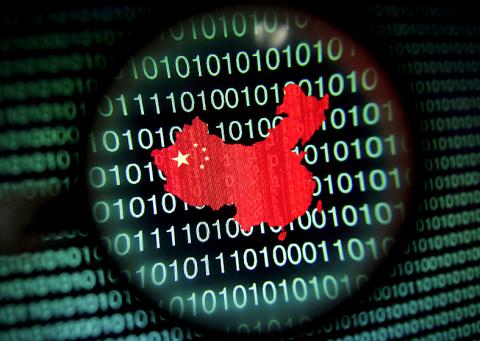Security researchers have many names for the hacking group that is one of the suspects for the cyberattack on the US government’s Office of Personnel Management: PinkPanther, KungFu Kittens, Group 72 and, most famously, Deep Panda.
However, to Jared Myers and colleagues at cybersecurity company RSA, it is called Shell Crew and Myers’ team is one of the few who has watched it mid-assault — and eventually repulsed it.
Myers’ account of a months-long battle with the group illustrates the challenges governments and companies face in defending against hackers that researchers believe are linked to the Chinese government — a charge Beijing denies.

Photo: Reuters
“The Shell Crew is an extremely efficient and talented group,” Myers said in an interview.
Shell Crew, or Deep Panda, is one of several hacking groups that Western cybersecurity companies have accused of hacking into US and other countries’ networks and stealing government, defense and industrial documents.
The attack on the OPM computers, revealed this month, compromised the data of 4 million current and former federal employees, raising US suspicions that Chinese hackers were building huge databases that could be used to recruit spies.
China has denied any connection with such attacks and little is known about the identities of those involved in them. However, cybersecurity experts are starting to learn more about their methods.
Researchers have connected the OPM breach to an earlier attack on US healthcare insurer Anthem Inc, which has been blamed on Deep Panda.
Myers says his team has no evidence that Shell Crew were behind the OPM attack, but believes Shell Crew and Deep Panda are the same group. And they are no newcomers to cyberespionage.
CrowdStrike, the cybersecurity company which gave Deep Panda its name due to its perceived Chinese links, traces its activities to 2011, when it launched attacks on defense, energy and chemical industries in the US and Japan, but few have caught them in the act.

INVESTIGATION: The case is the latest instance of a DPP figure being implicated in an espionage network accused of allegedly leaking information to Chinese intelligence Democratic Progressive Party (DPP) member Ho Jen-chieh (何仁傑) was detained and held incommunicado yesterday on suspicion of spying for China during his tenure as assistant to then-minister of foreign affairs Joseph Wu (吳釗燮). The Taipei District Prosecutors’ Office said Ho was implicated during its investigation into alleged spying activities by former Presidential Office consultant Wu Shang-yu (吳尚雨). Prosecutors said there is reason to believe Ho breached the National Security Act (國家安全法) by leaking classified Ministry of Foreign Affairs information to Chinese intelligence. Following interrogation, prosecutors petitioned the Taipei District Court to detain Ho, citing concerns over potential collusion or tampering of evidence. The

‘FORM OF PROTEST’: The German Institute Taipei said it was ‘shocked’ to see Nazi symbolism used in connection with political aims as it condemned the incident Sung Chien-liang (宋建樑), who led efforts to recall Democratic Progressive Party (DPP) Legislator Lee Kun-cheng (李坤城), was released on bail of NT$80,000 yesterday amid an outcry over a Nazi armband he wore to questioning the night before. Sung arrived at the New Taipei City District Prosecutors’ Office for questioning in a recall petition forgery case on Tuesday night wearing a red armband bearing a swastika, carrying a copy of Adolf Hitler’s Mein Kampf and giving a Nazi salute. Sung left the building at 1:15am without the armband and apparently covering the book with a coat. This is a serious international scandal and Chinese

Seventy percent of middle and elementary schools now conduct English classes entirely in English, the Ministry of Education said, as it encourages schools nationwide to adopt this practice Minister of Education (MOE) Cheng Ying-yao (鄭英耀) is scheduled to present a report on the government’s bilingual education policy to the Legislative Yuan’s Education and Culture Committee today. The report would outline strategies aimed at expanding access to education, reducing regional disparities and improving talent cultivation. Implementation of bilingual education policies has varied across local governments, occasionally drawing public criticism. For example, some schools have required teachers of non-English subjects to pass English proficiency

TRADE: The premier pledged safeguards on ‘Made in Taiwan’ labeling, anti-dumping measures and stricter export controls to strengthen its position in trade talks Products labeled “made in Taiwan” must be genuinely made in Taiwan, Premier Cho Jung-tai (卓榮泰) said yesterday, vowing to enforce strict safeguards against “origin laundering” and initiate anti-dumping investigations to prevent China dumping its products in Taiwan. Cho made the remarks in a discussion session with representatives from industries in Kaohsiung. In response to the US government’s recent announcement of “reciprocal” tariffs on its trading partners, President William Lai (賴清德) and Cho last week began a series of consultations with industry leaders nationwide to gather feedback and address concerns. Taiwanese and US officials held a videoconference on Friday evening to discuss the